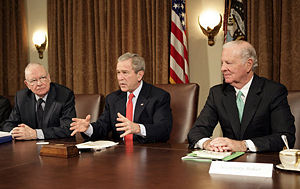Iraq Study Group: Difference between revisions
imported>Michel van der Hoek No edit summary |
imported>Michel van der Hoek No edit summary |
||
| Line 25: | Line 25: | ||
=== The Internal Approach (Recommendations 19-79) === | === The Internal Approach (Recommendations 19-79) === | ||
== Responses to the ISG Report == | |||
=== The United States Media and Politicians === | |||
=== Foreign Media and Politicians === | |||
The '''[[Israel|Israeli]]''' government rejected the ISG Report. Prime Minister [[Ehud Olmert]] criticized the report's finding that key to solving the problems in Iraq was to address the plight of the [[Palestinians]].<ref>"[http://www.csmonitor.com/2006/1207/dailyUpdate.html Iraq Study Group report sees mixed response in Israel]", ''Christian Science Monitor'', December 7, 2006. Retrieved April 25, 2008.</ref> | |||
=== The Bush Administration === | |||
'''Work in Progress''' | '''Work in Progress''' | ||
Revision as of 22:59, 25 April 2008

The Iraq Study Group (ISG), also known as the Baker-Hamilton Commission, was a bipartisan panel charged with assessing the situation in Iraq. It was appointed March 15, 2006 and published its report, which included 79 policy recommendations, on its website December 6, 2006. The ISG was led by Republican James Baker, a former Secretary of State, and Democrat Lee Hamilton, a former U.S. Representative.
Members of the Iraq Study Group
In addition to the two chairs, the ISG was made up of eight members from public service, four from the Republican Party and four from the Democratic Party. The members were:
Republicans
- Sandra Day O'Connor, former Supreme Court Justice
- Lawrence Eagleburger, former Secretary of State
- Edwin Meese III, former US Attorney General
- Alan Simpson, former U.S. Senator from Wyoming
Democrats
- Vernon Jordan, Jr., business executive
- Leon E. Panetta, former White House Chief of Staff
- William J. Perry, former US Secretary of Defense
- Charles Robb, former U.S. Senator from Virginia
Republican Rudy Giuliani resigned as a member on May 24, 2006. He was replaced by Edwin Meese. Republican Robert Gates resigned November 8, 2006, after being nominated by President George W. Bush to replace Donald Rumsfeld as Secretary of Defense. He was replaced by Lawrence Eagleburger.
Summary of ISG Report Findings
The ISG Report appeared at a time when "the situation in Iraq [was] grave and deteriorating."[1] The panel provided in total 79 recommendations which they believed would help make "Iraq, the region, and the United States of America ... stronger." [2] The recommendations were divided between those addressing international policy initiatives and those that addressed US policy within Iraq.
The External Approach (Recommendations 1-18)
The ISG recommended among others that the United States launch a diplomatic "offensive" in the Middle East to elicit help from Iraq's neighbors in quelling the rising violence in Iraq. In particular, the report proposed the Bush administration engage both Iran and Syria in direct negotations, using both "incentives and disincentives"[3] (Recommendations 9-12).
The Internal Approach (Recommendations 19-79)
Responses to the ISG Report
The United States Media and Politicians
Foreign Media and Politicians
The Israeli government rejected the ISG Report. Prime Minister Ehud Olmert criticized the report's finding that key to solving the problems in Iraq was to address the plight of the Palestinians.[4]
The Bush Administration
Work in Progress
References
James A. Baker III and Lee H. Hamilton et al. The Iraq Study Group Report. The Way Forward—A New Approach. Authorized Edition. New York: Vintage Books, 2006. ISBN 9780307386564
The Iraq Study Group Report full text (PDF)
Notes
- ↑ ISG Report, p. xiii
- ↑ ISG Report, p. xviii
- ↑ ISG Report, p. 52
- ↑ "Iraq Study Group report sees mixed response in Israel", Christian Science Monitor, December 7, 2006. Retrieved April 25, 2008.